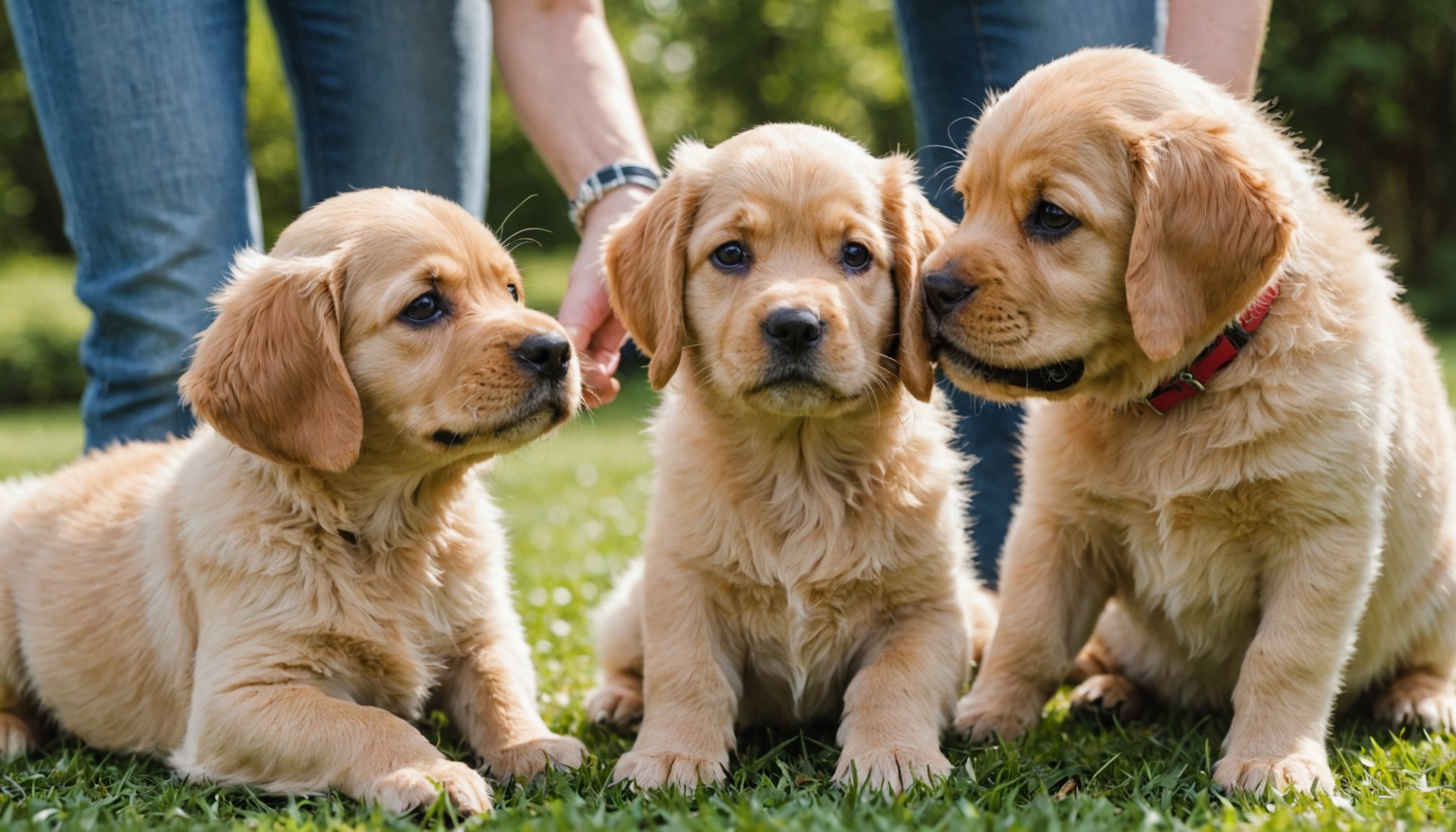Understanding the Importance of Socialization
Socialization is crucial in a puppy’s formative months, laying the foundation for future behavior and temperament. Early puppy socialization is key to preventing behavioral issues later in life. By exposing puppies to varied environments, sounds, and creatures, they develop resilience and adaptability, carrying these traits into adulthood.
The benefits of socializing pets extend to temperament management. A well-socialized puppy is less likely to exhibit fear-based aggression or anxiety, ensuring smoother interactions with other pets and humans. These interactions build a canine’s confidence and sociability. Owners often notice improved everyday experiences, such as during vet visits or when meeting new animals.
Also to see : Ultimate Guide to Diet Plans for Dogs with Liver Disease: Nourishing Strategies Unveiled
Early training intertwined with socialization encourages positive accustomed habits. Puppies learn patience, obedience, and how to respond appropriately to new stimuli. It establishes a framework for ongoing education, enhancing their ability to learn new commands and tricks.
Ultimately, the right balance of socialization signals a promising future for a puppy’s emotional health, ensuring they grow into well-adjusted pets. Employing thoughtful and planned socializing strategies early on can foster a lifetime of beneficial interactions.
Topic to read : Taming Energetic Pooches: Your Ultimate Guide to Reducing Excessive Barking
Preparing Your Puppy for Socialization
Before embarking on the journey of puppy preparation for socialization, ensure all essential vaccinations and health checks are complete. This protects both your puppy and others they might interact with from preventable diseases. Health assurance is the first step in introducing pets safely.
Create a safe environment for your puppy’s initial interactions. Controlled settings can help in managing stress levels and ensure that the young pup is not overwhelmed. Allow your puppy to explore new spaces gradually to build their confidence while ensuring they feel secure.
Desensitization techniques are valuable tools in preparing puppies. Start by gently exposing them to diverse sounds and sights in a controlled manner. Over time, increase these experiences as their comfort grows. For example, introducing household noises gradually helps puppies adjust without fear.
Remember, puppy preparation is an ongoing process. Every new introduction should be measured, keeping the puppy’s tolerance and reactions in mind. Observing their response assists in tailoring future exposures, ensuring a positive association while fostering resilience.
Gradual Introduction to Other Pets
Introducing a puppy to new pets requires patience and gradual exposure. Establishing controlled settings for these introductions can significantly ease the process. Begin gently, ensuring that encounters are conducted in neutral territories where neither animal feels territorial.
Introducing Dogs to Other Dogs
Introducing pets, especially dogs to one another, involves observing their body language closely. Start on neutral ground like a park. Both dogs should be on leashes but allowed enough room to maneuver and express themselves naturally. It’s crucial to look for signs of comfort or distress, such as wagging tails or growling.
Introducing Puppies to Cats
When introducing puppies to cats, ensure the cat has an escape route. Allow brief, supervised meetings while keeping interactions calm. Reward any positive behaviors with treats, fostering a positive association between the two animals.
Approaching Small Animals
Small animals can be particularly sensitive to new puppies. Controlled exposure is crucial. Allow the puppy to observe the small animal from a distance initially, then gradually close the distance. Always supervise these interactions, ready to intervene if the puppy becomes overly excited or the small animal appears stressed.
Techniques for Successful Integration
Successfully integrating a puppy into new environments requires applying integration techniques that promote positive interactions. One of the most effective methods is using positive reinforcement to encourage desirable behaviors. By rewarding a puppy with treats or praise for good behavior, you reinforce these actions, making them more likely to recur.
Establishing a reliable routine is essential. Incorporating playdates and controlled interactions can help your puppy become comfortable with varied social settings. This predictability nurtures familiarity and reduces anxiety during introductions to new pets or people. When puppies anticipate positive experiences, integration becomes smoother.
Interactive training sessions are also crucial for fostering healthy relationships between puppies and other animals. These sessions teach them how to respond appropriately to diverse stimuli. Training can involve a mix of controlled guided lessons and playful exercises that allow the puppy to engage positively with others, all the while learning the norms of social behavior.
By embedding these integration techniques into everyday life, puppy owners pave the way for enduring and harmonious relationships. This proactive approach ensures that your puppy grows into a well-adjusted and sociable pet, ready to thrive alongside others.
Common Challenges in Socializing Puppies
Socialization challenges often emerge as puppies begin to explore the world. Identifying these issues early is critical to prevent long-term behavior problems. Common challenges like fear and aggression can manifest when puppies encounter new experiences or strangers. These reactions are often rooted in anxiety or a lack of exposure to diverse stimuli.
Addressing aggression requires a measured approach. Implementing calm and controlled settings is essential. Gradual exposure to new situations can help reduce fear-based responses over time. For example, if a puppy displays aggressive behavior towards unfamiliar animals, controlled introductions in neutral environments can ease tensions. It’s vital to reward calm behavior to reinforce positive interactions.
Real-life examples highlight the effectiveness of these strategies. A timid puppy might initially shy away during group play sessions but can slowly gain confidence through consistent reinforcement and peer play. Witnessing gradual improvements in demeanor reinforces the value of socialization efforts.
Successfully overcoming these challenges requires patience and a commitment to early intervention. By proactively addressing these issues, owners contribute to the development of well-adjusted and sociable pets, capable of adapting to various environments with ease.
Professional Insights and Case Studies
Unveiling expert perspectives on puppy socialization provides invaluable insights into fostering well-adjusted pets. Veterinarian advice is paramount when addressing behavior and health intersections. They often emphasize the importance of early socialization, combined with regular health checks, to avert future issues. Veterinarians also stress tailoring approaches based on individual puppy needs, as every puppy’s temperament can vary significantly.
Trainer perspectives offer practical methodologies for successful integration. Trainers advocate for consistent positive reinforcement combined with gradual exposure techniques. They recommend structured routines with varied stimuli to cultivate resilience and adaptability, ensuring puppies are prepared for diverse environments. Incorporating controlled social interactions helps in honing a puppy’s confidence and reducing anxiety.
Case studies illuminate the real-world application of these expert strategies. For instance, in one case, a previously timid puppy thrived under a regimen blending positive reinforcement and carefully staged social experiences. These practical examples underscore the efficacy of strategic socialization interventions, showcasing the profound impact on long-term behavior and social adeptness.
Considering such professional insights and case studies underscores the benefit of informed, tailored techniques to nurture well-rounded pets. Owners who implement these strategies typically witness noticeable improvements in their puppy’s demeanor and social skills.
Maintaining Ongoing Socialization
Continuous socialization is essential throughout your puppy’s life to ensure lasting behavioral benefits. As puppies mature, it’s crucial to maintain regular interaction with other dogs, people, and environments. These engagements encourage adaptability and reinforce positive behavior patterns established in the early months.
Incorporating socialization into daily routines requires intentional planning. Simple activities like daily walks in diverse settings, playdates with other well-behaved dogs, and visits to pet-friendly locations help sustain social skills. Regular exposure to varied situations keeps your pet adaptable and responsive.
Ongoing training techniques serve to bolster the training foundation laid during initial socialization phases. Interactive sessions that mix routine commands with new challenges ensure your pet remains engaged and eager to learn. These activities anchor good behaviors, helping avoid regression and reinforcing their role as part of a harmonious household.
Behavioral reinforcement should not be overlooked. Continue to reward positive interactions, whether it’s calmly greeting a stranger or responding appropriately to a new stimulus. Encouraging these behaviors with praise or treats nurtures their development into a sociable, confident pet.






